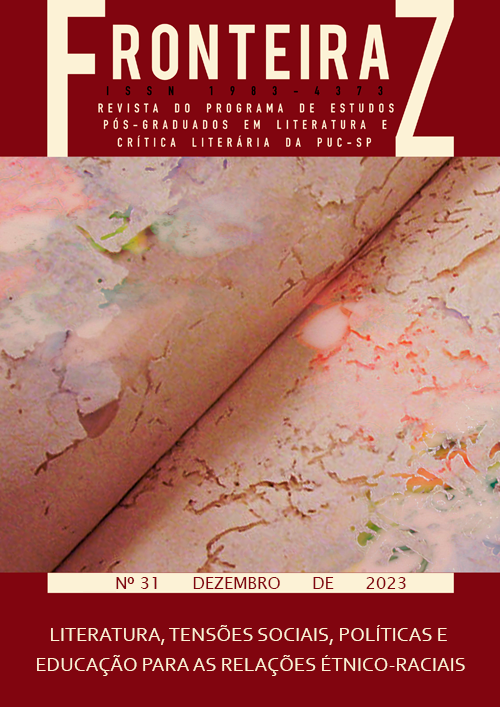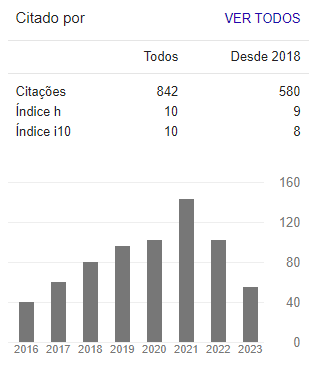Subalternity and motherhood
an analysis of the short story “Forçadamente Mulher, Forçosamente Mãe”, by Dina Salústio
DOI:
https://doi.org/10.23925/1983-4373.2023i31p64-79Keywords:
Cape Verde; Dina Salústio; Post-colonial feminism; Female authorship; Identity.Abstract
In the light of the post-colonial feminist perspective, this brief analysis proposes to analyze the short story “Forçadamente Mulher, Forçosamente Mãe”, by Cape Verdean author Dina Salústio, which composes the work Mornas era as noites (2002). Through this article, we intend to problematize the subaltern female identity in Cape Verdean society, having early pregnancy as a central issue. In the historical result of social, political and cultural conflicts, certain African countries, such as Cape Verde, still have early motherhood as a common adversity for young girls, thus compromising a lifetime (or two). Based on postmodern theories, we analyze aspects such as subalternity, the female subject and her condition. To address topics such as feminism and post-colonialism, we will draw on readings in Spivak (2010), Santos (2015), Vergès (2020). And on female authorship in Cape Verde, we will have Gomes (2015) at the core. The present study aims to reflect on the Cape Verdean female identity and its reorganization.
References
ADICHIE, C. N. Sejamos todos feministas. Trad. Christina Baum. Companhia das Letras: São Paulo, 2017.
AMIUDE, I. African Women: Voicing feminisms and democratic futures. In: A. I. SAMATAR. International Feminisms: Divergent Perspectives. Macalester International, v. 10, article 9, p. 47-68, spring, 2001. Disponível em: https://digitalcommons.macalester.edu/cgi/viewcontent.cgi?article=1244&context=macintl. Acesso em: 28 nov. 2023.
BADINTER, E. Um amor conquistado: o mito do amor materno. Trad. Waltensir Dutra. Rio de Janeiro: Editora Nova Fronteira, 1985.
BALLESTRIN, L. América Latina e o giro decolonial. Revista Brasileira de Ciência Política, Brasília, n. 11, p. 89-117, maio - agosto de 2013. Disponível em: https://doi.org/10.1590/S0103-33522013000200004. Acesso em: 28 nov. 2023.
BAHRI, D. Feminismo e/no pós-colonialismo. Revista Estudos Feministas, v. 21, n. 2, p. 659-683, 2013. Disponível em: https://doi.org/10.1590/S0104-026X2013000200018. Acesso em: 28 nov. 2023.
BHABHA, H. K. O local da cultura. Trad. Myriam Avila, Eliane Livia reis, Glauce Gonçalves. 2. ed. Belo Horizonte: Editora UFMG, 1998.
DUNAWAY, W. A. The Semiproletarian House hold over the Longue Durée of the Modern World-System. In: LEE, Richard (ed.). The Longue Durée and World-Systems Analysis. Albany: State University of New York Press, p. 97-136, 2012. Disponível em: https://www.researchgate.net/publication/228784773_The_Semiproletarian_Household_over_the_Long_Duree_of_the_Modern_World-System. Acesso em: 28 nov. 2023.
EVARISTO, C. Os amores de Kimbá. In: C. EVARISTO. Olhos D’água. Rio de Janeiro: Pallas Fundação Biblioteca Nacional, 2015.
GAMA-KHALIL, M. M. O espaço do fantástico como leitor das diferenças sociais: uma leitura de O homem cuja orelha cresceu. O eixo e a roda: Revista de literatura brasileira, Belo Horizonte, v. 17, p. 89-102, 2008. Disponível em: https://www.researchgate.net/publication/281042189_O_espaco_do_fantastico_como_leitor_das_diferencas_sociais_uma_leitura_de_O_homem_cuja_orelha_cresceu. Acesso em: 13 jun. 2023.
GILMAN, C. P. Women and economics. A study of the economic relation between men and women as a factor in social evolution. Boston: Small, Maynard & Company, 1898.
GOMES, S. C. (org.). Literatura Cabo-verdiana: leituras universitárias. Cáceres: UNEMAT, 2015.
GONZALEZ, L. A mulher negra na sociedade brasileira. In: M. T. LUZ, (org.). O lugar da mulher: estudos sobre a condição feminina na sociedade atual. Rio de Janeiro: Graal, 1982.
HALL, S. Da diáspora: identidades e mediações culturais. Trad. Adelaine La Guardia Resende, Ana Carolina Escosteguy, Cláudia Álvares, Francisco Rüdiger, Sayonara Amaral. Belo Horizonte: Editora UFMG, 2009.
MENDES, M. E. P. S. M. Configurações da maternidade africana em Yvonne Vera: em busca de novos olhares. In: 13º MUNDOS DE MULHERES & FAZENDO GÊNERO 11, 2017, Florianópolis. Anais Eletrônicos, Florianópolis: UFSC, 2017, p. 1-12. Disponível em: http://www.en.wwc2017.eventos.dype.com.br/resources/anais/1503784765_ARQUIVO_CONFIGURACOESDAMATERNIDADEAFRICANAEMYVONNEVERA26ago.pdf. Acesso em: 28 nov. 2023.
SALGADO, M. T. Noites nada mornas de Dina Salústio: a oportunidade do diálogo. Abril, Niterói, v. 1, n. 1, p. 36-40, 2008. Disponível em: https://periodicos.uff.br/revistaabril/article/view/29835. Acesso em: 15 jun. 2023.
SALÚSTIO, D. Mornas eram as noites. 3. ed. Praia: Instituto da Biblioteca Nacional, 2002.
SPÍNOLA, D. Mornas eram as noites. In: M. VEIGA (org.). Cabo Verde: insularidade e literatura. Paris: Karthala, 1998.
SPIVAK, G. C. Pode o subalterno falar? Trad. Sandra Regina Goulart Almeida, Marcos Pereira Feitosa, André Pereira Feitosa. Belo Horizonte: Editora UFMG, 2010.
VERGÈS, F. Um feminismo decolonial. Trad. Jamille Pinheiro Dias, Raquel Camargo. São Paulo: Ubu editora, 2020.
Downloads
Published
How to Cite
Issue
Section
License
Copyright (c) 2023 FronteiraZ. Journal of the Postgraduate Studies in Literature and Literary Criticism Program

This work is licensed under a Creative Commons Attribution-NonCommercial 4.0 International License.







 Este obra está licenciada com uma Licença
Este obra está licenciada com uma Licença 